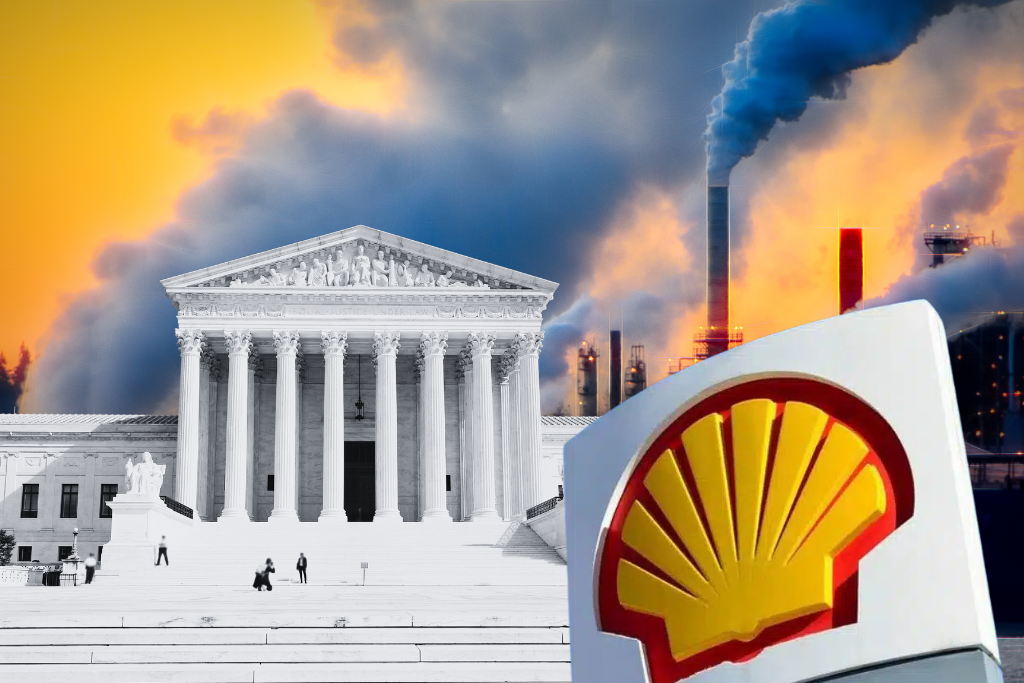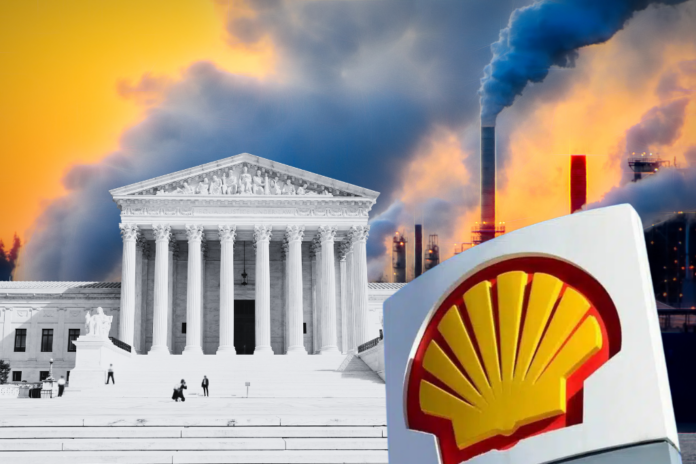Huge Snub for Big Oil at the Supreme Court
Oil companies failed to persuade the justices to shield them from the growing number of state lawsuits seeking damages for the harms caused by climate change.

Big Oil has failed to persuade the U.S. Supreme Court to shield it from numerous state climate lawsuits filed across the country seeking damages for the harms caused by climate change — harms like the historic, supercharged urban fires burning in Los Angeles.
The justices held a conference on Friday, January 10 to determine whether to weigh in on this state climate litigation against oil companies — specifically whether to hear arguments in their appeal of a Hawaii State Supreme Court decision that gave the green light to Honolulu’s lawsuit against Shell, ExxonMobil, Sunoco, BP, Chevron, and others. But today the Supreme Court declined that request to review whether federal law prevents states and cities from suing the companies.
City & County of Honolulu v. Sunoco LP is one of more than a dozen such lawsuits against the major oil companies for allegedly knowing about the harms caused by their products and concealing that information from the public for several decades.
Lower courts have refused to dismiss or move the case to federal court. As I wrote last June, the oil industry and its allies then tried to convince the justices to shield them from climate liability lawsuits brought by cities and states throughout the U.S before they face any court trials over climate-related damages. Right-wing advocacy groups launched a public messaging campaign and conservative editorial boards weighed in.
In their appeal, the oil companies argued that the Hawaii Supreme Court erred by finding the case was not preempted by federal laws.
The U.S. Solicitor General Elizabeth Prelogar delivered the federal government’s official response in December. The question as laid out in their brief was whether the Hawaii Supreme Court “correctly affirmed the denial of petitioners’ motion to dismiss, which argued that respondents’ state-law claims alleging the deceptive marketing of fossil-fuel products were either governed by the federal common law of transboundary air pollution or preempted by the Clean Air Act, 42 U.S.C. 7401 et seq.”
Prelogar argued that: 1) The Supreme Court “lacks jurisdiction to review the Hawaii Supreme Court’s interlocutory decision, and the existence of pending constitutional issues counsels against review at this time;” 2) the merits of the Hawaii court’s decision “do not warrant review at this time;” and 3) the oil companies have not demonstrated that any appellate court would have reached a different outcome than the court below.
The outgoing Biden Administration had also opposed an effort by GOP-led states to block the suits.
Shell on behalf of all the companies responded that the Solicitor General had effectively reversed the government’s position that the Clean Air Act preempts claims in these climate cases. “That reversal deepens an acknowledged conflict only this Court can resolve,” they wrote.
But without a comment or dissent, the justices turned down the appeals from Shell and the other oil producers. Notably, Justice Samuel Alito said he did not take part in the court’s decision, presumably because he owns stock in oil companies affected by the dispute, the Los Angeles Times reports.
This is big news because now the oil companies will have to contend with the various state lawsuits — Hawaii’s own, which will head toward an actual trial—but also a major one being brought by fire-ravaged California. In September 2023, Gov. Gavin Newsom and Attorney General Rob Bonta filed that lawsuit in San Francisco County Superior Court against five of the largest oil and gas companies.
One of the harms that California’s lawsuit points to is the increased risk, intensity, and cost of climate-fueled wildfires like the Palisades and Eaton fires that have destroyed whole communities. “These catastrophic, climate change-driven wildfires result in substantial losses to the State’s financial resources,” the lawsuit reads. “The State spends billions of dollars on wildfire response annually; however, the cost of fighting more extreme climate change-driven wildfires is increasing.” In Newsom’s recently proposed state budget for the year ahead, the governor is asking lawmakers to pass at least $2.5 billion in response to the LA wildfires — $1 billion in recovery aid and $1.5 billion in new wildfire preparation funds.
A very preliminary estimate by AccuWeather put the potential damage and economic losses from this round of mega fires at between $135 billion and $150 billion, and some fire experts believe it could be the most destructive wildfire event in U.S. history. Admirably, Angelenos and private donors have been rallying to help those affected. Beyonce’s Foundation has pledged $2.5 million; Netflix has said it will donate $10 million; a dozen LA sports teams are giving a combined (paltrier) $8 million. So, why on earth wouldn’t the polluters behind climate change be expected to pay up?
Now that the justices have rebuffed the oil industry’s appeal, there’s a good chance that states like Hawaii and California will get to ask the courts to force Big Oil to do just that.

